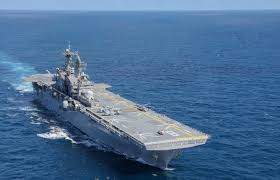Makin Island ARG Operating in the South China Sea While Beijing Claims U.S. ‘Muscle Flexing’
Thursday, December 10, 2020
Categories: ASCF News Emerging Threats National Preparedness

Chinese reports accuse the U.S. of “muscle-flexing” after an American amphibious ready group quietly deployed to the South China Sea earlier this week.
USS Makin Island (LHD-8) and USS Somerset (LPD-25) entered the South China Sea on Sunday, according to Chinese state press reports, a Beijing-backed think tank that monitors U.S. military movements in the South China Sea, and publicly available satellite imagery.
The move, not announced by the U.S. Navy, was decried in the Chines press as “a bluff and muscle-flexing action that pundits believe would damage regional stability,” according to a Monday report in the state-controlled Global Times.
In response to the American ARG operating in the region, a trio of Chinese warships conducted an “unscripted” live-fire drill in the South China Sea, Chinese language state media reported on Monday, according to Newsweek.
The People’s Liberation Army Navy corvettes were operating off the southern coast of China and conducted the drills the day after the amphibious warships transited into the South China Sea past the Philipines.
U.S. Navy officials told USNI News the Chinese corvettes were hundreds of miles away from the two American ships and that the Chinese operations were likely not in reaction to the U.S. ships. An official also said the two amphibious warships had not encountered any unsafe or unprofessional behavior from Chinese ships in the South China Sea.
The ARG entered the region at the same time as Acting Defense Secretary Chris Miller was on a regional tour that includes Indonesia, the Philippines and Hawaii, according to press reports.Makin Island, Somerset and USS San Diego (LPD-22) departed the West Coast in October to complete final certification exercises ahead of a deployment with the 15th Marine Expeditionary Unit embarked.
While the Makin Island ARG and 15th MEU completed their certifications in mid-November and have since continued west towards the South China Sea, the Navy has yet to officially confirm that the units are deployed for national tasking.
“The Makin Island Amphibious Ready Group (ARG) and 15th Marine Expeditionary Unit (MEU) are currently underway in U.S. 7th Fleet. U.S. forces routinely operate in the region to include the South China Sea as we have for more than a century as a commitment to regional stability and a free and open Indo-Pacific,” U.S. Pacific Fleet spokesman Cmdr. Myers Vasquez said in a statement to USNI News. “All of our operations are designed to be conducted in accordance with international law and demonstrate that the United States will fly, sail, and operate wherever international law allows.”
When asked by USNI News over the last several weeks, the Navy has said the ARG/MEU was “conducting routine operations” without providing additional information.
The months-long process for training and certifying an ARG/MEU for a deployment is well understood by allies and adversaries alike. Makin Island went to sea in October to complete its Composite Training Unit Exercise (COMPTUEX) ahead of deployment. The ARG/MEU left the U.S. 3rd Fleet area of operations in the last two weeks for the Western Pacific.
The line for when a ship is in training versus when it’s available for national tasking has become much thinner since the start of the global COVID-19 pandemic. In the past, after COMPTUEX an ARG or carrier strike group would return to port for upwards of a month ahead of the formal deployment. Now, to minimize the possibility of sailors contracting COVID-19 ahead of deployment, they quarantine ahead of the drills and then remain at sea throughout COMPTUEX and into the start of the deployment.
U.S. Pacific Fleet has been inconsistent in announcing deployments of major fleet units like ARGs and carrier strike groups since current commander Adm. John Aquilino took over in 2018.
Aquilino, the Trump administration’s nominee to command U.S. Indo Pacific Command, has at times directed no notice when major formations deploy, several defense officials have told USNI News over the last 18 months.
Earlier this week, USS Theodore Roosevelt (CVN-71) departed from San Diego, Calif., with no notice for a sustainment exercise that will roll into a deployment, USNI News understands. “The strike group is a combat-ready national asset capable of both deterrence and offensive strike that provides our national command authority with flexible options, all domain access, and a visible forward presence,” 3rd Fleet spokesman Cmdr. Sean Robertson told USNI News on Monday.Photo: Amphibious assault ship USS Makin Island (LHD-8) underway in the eastern Pacific on April 20, 2020. US Navy Photo
Link: USNI.ORG




